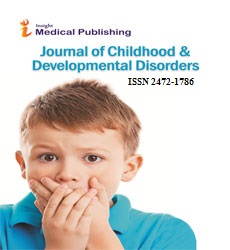Call to Action for Early Child Development for Sustainable Society
Sanober Nadeem
DOI10.4172/2153-0645.1000163
College of Science and Health Professions, King Saud Bin Abdulaziz University, Riyadh, Kingdom of Saudi Arabia
- *Corresponding Author:
- Sanober Nadeem
College of Science and Health Professions King Saud Bin Abdulaziz University
Mail Code 3150, Riyadh, Kingdom of Saudi Arabia
Tel: +92-3013301554
E-mail: sanober.nadeemkhan@gmail.com, nadeemsa@ksau-hs.edu.sa
Received date: August 17, 2016; Accepted date: September 07, 2016; Published date: September 14, 2016
Citation: Nadeem S. Call to Action for Early Child Development for Sustainable Society. J Child Dev Disord. 2016, 2:4. doi:10.4172/2472-1786.100036
Abstract
Early years of life are very important for future development and sustainable society. Things that happen during early period may effect lifetime. Children, who start life with proper food, love and care, safe nurturing environment and responsive caregivers reach their optimum development. Therefor there is call to action for early child development through implement the sustainable development goals for better future of children and communities.
Keywords
Early child development; Sustainable development goals; ECD programs; ECD policies
The initial years of life are very important for later development and sustainable society. Things that happen in physical and social environment during childhood may effect lifetime. This is the period of most rapid brain development; trillions of neurons develop and form connections that are very important for life long trajectories of health, learning and emergence of physical, social, emotional and cognitive abilities. Children who receive best start in life including good care, safe nurturing environment, responsive relationship, proper food and nutrition develop healthy bodies and minds [1].
Over 200 million children under 5 years of age fail to develop their full potential and most of them are living in developing countries [2]. This has serious human, social and economic ramifications to achieve prosperity that encompass social and economic development and sustainability. Several biological and environmental factors play important role in early childhood development (ECD). Abusive environment, neglect, exploitation, toxic stress, extreme poverty, maternal mental health may alter the architecture of the brain and cause delay development. Gender disparities during childhood are another serious threat for optimum development. In 2011, Walker and colleague stated that ECD Interventions should focus to reduce children’s risk exposure and to endorse protective factors [3].
The evidences provided by neuroscience indicate that wellbeing of young children is very crucial, early interventions are more effective than later investment. To this end, policymaker should take wise decision to address the needs of young children and their families and make strategies on the basis of scientific knowledge that requires efforts of every sector [4]. In 2015, under the umbrella of United Nation, countries adopted 17 goals and 169 targets to transform the world for sustainable development. Each goal has specific targets to be achieved over the next 15 years [5]. These goals are window of opportunity for young children who are living in poverty, facing gender inequalities and lack of learning opportunities. Now counties are liable to implement quality early child care programs and develop partnership to this cause.
Finally, for future human capital development, it would be helpful to design comprehensive and holistic programs that cater developmental and learning needs of the child; provide support to families and develop balance communities. Each and every one needs to perform their part for the Sustainable Development Goals’ (SDGs) targets to be reached, that require partnership with multiple sectors, multiple stakeholders beside public advocacy about benefits of ECD [6].
References
- National Scientific Council on the Developing Child (2016) Young children develop in an environment of relationships. Cambridge, MA: National Scientific Council on the Developing Child; 2004. Working Paper No. 1.
- Grantham-McGregor S, Cheung YB, Cueto S (2007) Developmental potential in the first 5 years for children in developing countries. Lancet 369: 60-70.
- Walker SP, Wachs TD, Grantham-McGregor S (2011) Inequality in early childhood: risk and protective factors for early child development. Lancet 378: 1325-1338.
- Center on the Developing Child at Harvard University (2007) A science-based framework for early childhood policy: Using evidence to improve outcomes in learning, behavior, and health for vulnerable children. Cambridge, MA, USA.
- https://www.un.org/sustainabledevelopment/sustainable-development-goals/
- Daelmans B, Black MM, Joan L, Jane L, Linda R, et al. (2015) Effective interventions and strategies for improving early child development. BMJ 351: h4029.
Open Access Journals
- Aquaculture & Veterinary Science
- Chemistry & Chemical Sciences
- Clinical Sciences
- Engineering
- General Science
- Genetics & Molecular Biology
- Health Care & Nursing
- Immunology & Microbiology
- Materials Science
- Mathematics & Physics
- Medical Sciences
- Neurology & Psychiatry
- Oncology & Cancer Science
- Pharmaceutical Sciences
